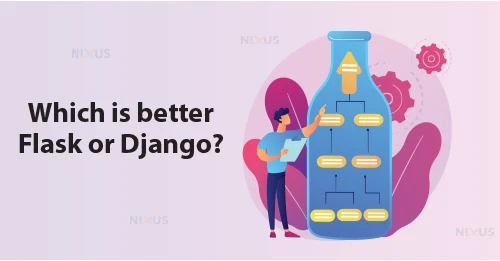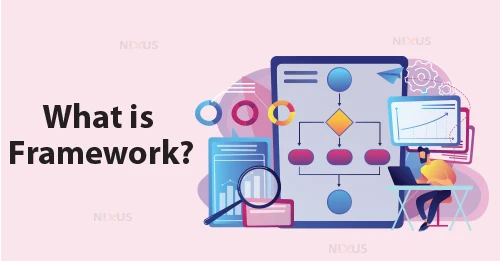Which is Better for Machine Learning – Flask vs. Django
Python and its fantastic frameworks are adored by all. Flask and Django are the most talked-about Python frameworks out of the many available options. Unsurprisingly, everyone is now interested in how Flask and Django vary from one another and how to decide which to use.
Python has two key web development frameworks: Flask and Django. Python is a powerful programming language that offers a wide range of web frameworks. It improves the creation of complex and advanced web apps.
Both Flask and Django are robust, extendable web frameworks that provide a comparable level of request processing and content-serving features. But the range of responsibilities varies between the two. Where one is a full-stack, and the other is a powerful micro-framework made to meet the demands of contemporary web development solutions.
Most people who are creating machine learning models use Python. Since there are numerous frameworks available, the deployment phase presents the main issue. Determining which framework to employ could make things more confusing. But don’t worry! This article discusses how you can make the right choice while choosing between these two and, hence, making things clear for you.
Framework
A framework is a group of components that aids in the creation of web application codes by programmers. Frameworks are finished packages that speed up, simplify, scale, and guarantee the reliability of web development.
While dealing with Python projects like creating a web application, you will unavoidably run across a lot of tiresome and repetitive activities. These duties involve creating back-end logic, designing UI, and connecting the app to the internet so it can work better with a browser. Web frameworks are created to implement features frequently seen in web applications, like converting URLs to corresponding Python code segments.
Flask
Flask is a Python-based microweb framework. The implementation of Flask is likewise quite simple to understand. One can get going on this with only a few code lines. Leading technology companies like Netflix, Mozilla, MIT, Uber and others use Flask.
The term “micro” refers to concentrating on keeping the core uncomplicated but extendable. It is not reliant on external libraries to carry out a framework’s functions. A lot of programmers prefer to begin with the Flask framework since it tends to be independent, adaptable, and straightforward.
Django
Django is another free programming language with enhancement in its performance and functionality. Because Django enables developers to perform common tasks with no intervention from management, systems, and any of the protocols, it is the favored choice among programmers.
With material in HTML, XML, JSON, and other forms, it is a versatile framework that can be used to create any type of website, for example, social network sites, content management systems, news websites, etc. Note that any client-side framework can be combined with Django.
It is a secure framework that automatically manages tasks such as transaction management, clickjacking, user account management, etc.
Instagram, Disqus, Spotify, National Geographic, Pinterest, etc., are some examples of companies that are using the Django framework.
Features of Flask
- A quick debugger and an integrated development server.
- As a component-based framework, it has a high degree of scalability.
- WSGI 1.0 compliance and Jinja2 templates are both used.
- RESTful request dispatch.
- Extremely adaptable.
- Functionalities for handling HTTP requests.
- Supports unit testing.
- Simple to set up in a production environment.
Features of Django
- Framework with integrated batteries.
- Permits quick development.
- Simple to scale and expand.
- Incredibly safe and adaptable.
- Supports numerous databases.
- Supports a variety of front-end tools.
- Vast and supportive community.
Advantages and disadvantages of Flask
| Advantages | Disadvantages |
| With Flask, scaling the server to meet additional load or traffic is simple. For the same reason, Pinterest opted to switch from Django to Flask. | Due to Flask’s restricted toolkit and lightweight design, developers must add extensions (such as libraries) manually. When there are too many extensions installed, the app will take longer to respond to queries. |
| With Flask, getting started is simpler. With a basic foundation, Python is simple to learn. Furthermore, if you run into any issues, there is a tonne of documentation available. | The modularity of Flask makes it difficult for developers who join in the middle of a project to comprehend the code and the app’s layout. |
| The flask is straightforward and adaptable. Any portion of it is simple to modify. | As the project moves further, Flask frequently results in increasing maintenance expenditures. |
| You may quickly construct numerous Flask applications with distinct objectives using the modular Flask code, which improves testability and efficiency. | It comprises a smaller community and less support than Django. |
Advantages and disadvantages of Django
| Advantages | Disadvantages |
| It is compatible with dynamic HTML pages and is portable. | Things get harder and fixed when you use a monolithic style. |
| This framework is extremely secure. It also has built-in unit testing for web apps. | To work with Django, developers must have a broad knowledge base. |
| Developers can use pre-defined templates, and it is usually preferred for large projects. | Silently failing templates |
| It supports multiple languages and characters. | The codebase is substantially larger than the flask. |
Which is better: Flask or Django?

Each framework has distinct features and functionality. While Flask is a lightweight framework with frequently encountered functionality, Django is an open-source framework for building web applications quickly.
Developers can choose Flask for building small web applications or switch to Django for larger projects because Django has a large developer community and is ideal for building one-of-a-kind websites.
To create a complicated application using Django, extensive knowledge is needed. While flask takes fewer lines of code and is simpler for beginners to comprehend, it is not practical for larger projects. Django is better for designing incredible apps, but it can be a little challenging for beginners to understand.
Conclusion
It is simple to draw the conclusion that each web framework has advantages after reading and fully understanding the extensive details about them.
